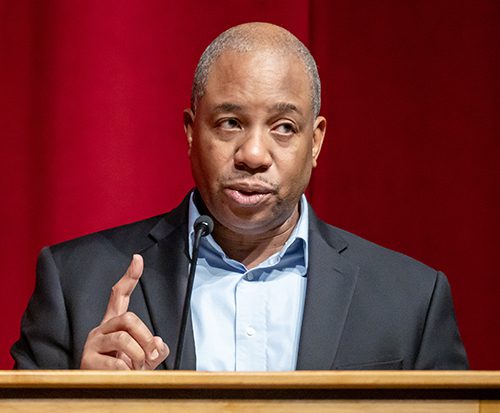
RALEIGH — A new superintendent, reading achievement, school choice gains, policy changes and a hurricane all affected North Carolina education in 2024.
Outgoing state Superintendent Catherine Truitt faced a pandemic at the start of her term and dealt with the devastation wrought by Hurricane Helene near its end.
With schools shuttered at the start of her tenure due to the COVID-19 pandemic, her initial thoughts were the situation “was untenable.”
Just as things were getting back to normal following the pandemic, Hurricane Helene hit the western part of the state in late September, impacting 459 local public schools in 28 districts and 24 public charter schools.
The North Carolina Department of Public Instruction’s legislative funding requests following Helene included $16 million for school nutrition staff and $150 million in repairs and renovations, school nutrition, equipment, supplies, and technology losses not covered by insurance.

Democrat Maurice “Mo” Green won the race to replace Truitt and will take the reins while dealing with the ramifications of Hurricane Helene.
Green is just one of a few new faces in top spots for North Carolina K-12 education.
Gov. Roy Cooper appointed former Wake County Public Schools Superintendent Catty Moore to the state Board of Education in early October, filling the vacancy left by former Charlotte-Mecklenburg educator James Ford, another Cooper appointee.
New teacher and principal of the year awards were handed out in April and May, respectively.
Heather Smith, a math teacher from Haywood County Schools, was named the 2024 Burroughs Wellcome Fund North Carolina Teacher of the Year. She takes over for the current teacher of the year, Chapel Hill-Carrboro City Schools English teacher Kimberly Jones.
Principal Beckie Spears was named the 2024 Wells Fargo North Carolina Principal of the Year. Spears is the principal of Wilkesboro Elementary School, and she takes over for Principal Donna Bledsoe of Surry County.
School choice saw big growth and big wins this year, particularly the Opportunity Scholarship program (OSP).
The OSP was expanded to all students in the state in 2023, and there were a record 72,000 new applications for the program in 2024.
Due to the considerable number of new applicants this year, the established funding quickly ran out. The result was a 56,000-deep backlog that was resolved by House Bill 10, but Cooper vetoed the legislation.
The legislature ended its regular short session without addressing the backlog, which sparked a July 1 rally by families demanding lawmakers “Keep Your Promise” to fund the scholarships.
By September, a deal was struck between the House and Senate for $463.5 million in additional OSP funding. Cooper held a press conference around the same time, attacking the legislature for “returning to Raleigh to siphon hundreds of millions of taxpayer dollars out of public schools and give it to the wealthy through private school vouchers.”
In November, the legislature overrode Cooper’s veto of House Bill 10, and by early December, the North Carolina Education Assistance Authority started notifying waitlisted families about how to receive their scholarship funding.
Public charter schools in the state continued to grow in 2024. Charter schools also had big waitlists, with 169 charter schools reporting 85,551 waitlisted students at the start of the 2023-24 school year.
There were also policy changes in 2024.
At its November meeting, the state Board of Education amended a policy removing the ability to take nonelective core courses required for graduation using a pass/fail grading method. The policy amendment, which takes effect this year, addresses the pass/fail option that some districts were allowing students enrolled in credit recovery programs to use in order to graduate.
Changes to teacher license discipline policies included new rules allowing greater flexibility in acting on a license in question and being able to impose wider disciplinary sanctions “instead of just suspending or revoking a license,” as well as being able to “summarily suspend” a license when necessary.
The changes to teacher license disciplinary actions dovetail with the “Protect Our Students Act,” which gave the board authority to adopt temporary rules regarding disciplinary action against teacher licenses and amend the Standards of Professional Conduct.
Under that law, which took effect this month, the crimes of sexual activity with a student and taking indecent liberties were raised to a Class G felony from a Class I felony. Education officials failing to report a teacher engaged in misconduct to the state Board of Education can face a Class I felony charge.


